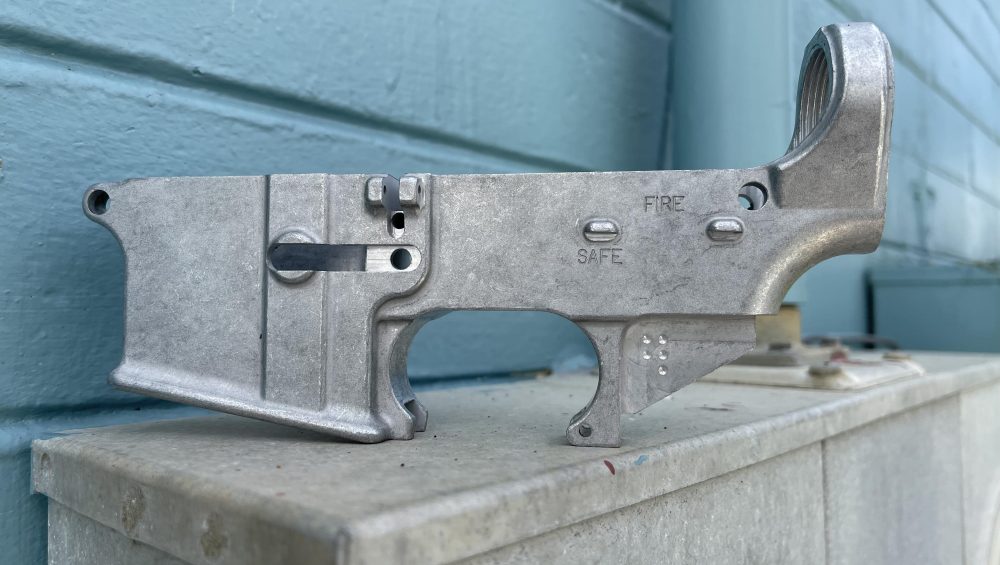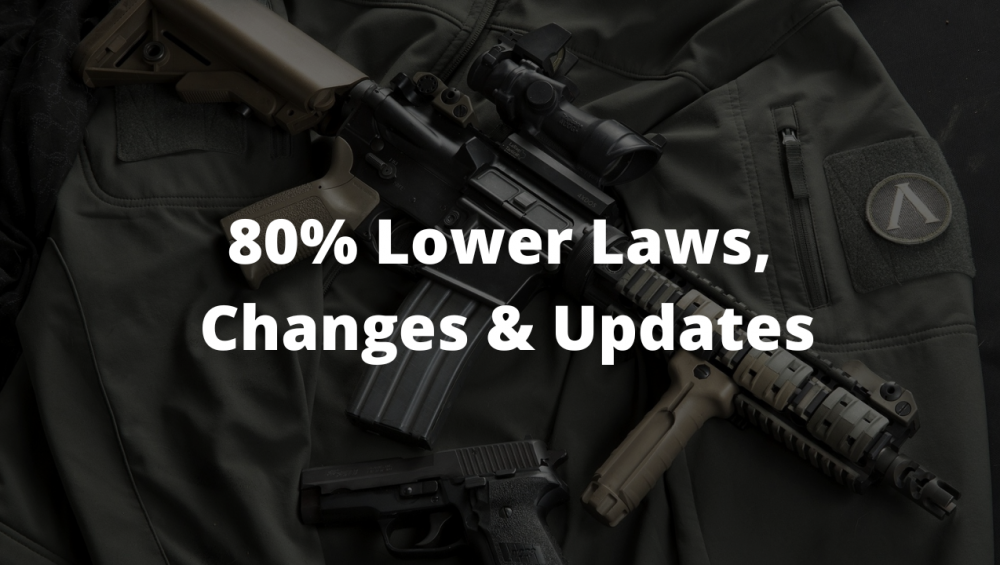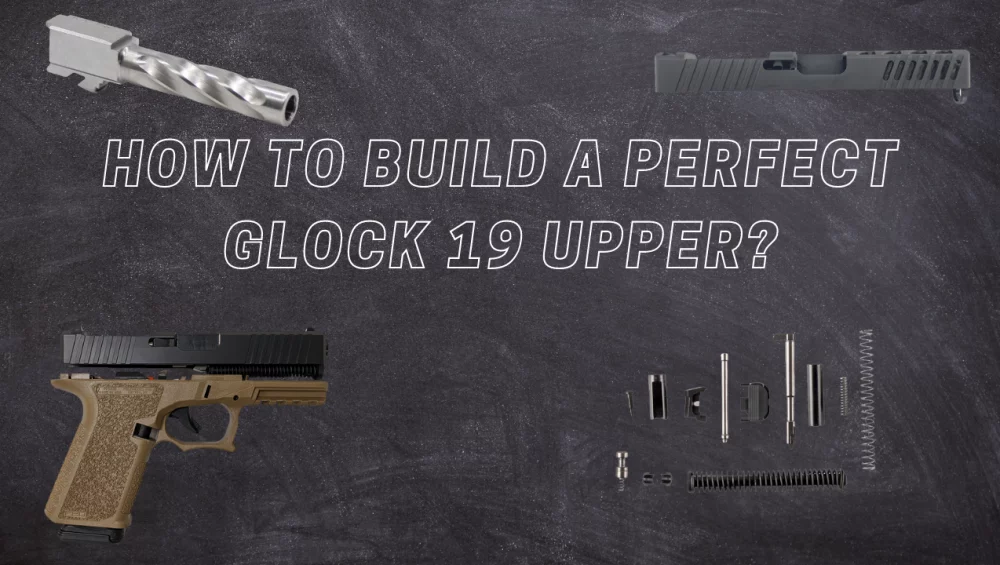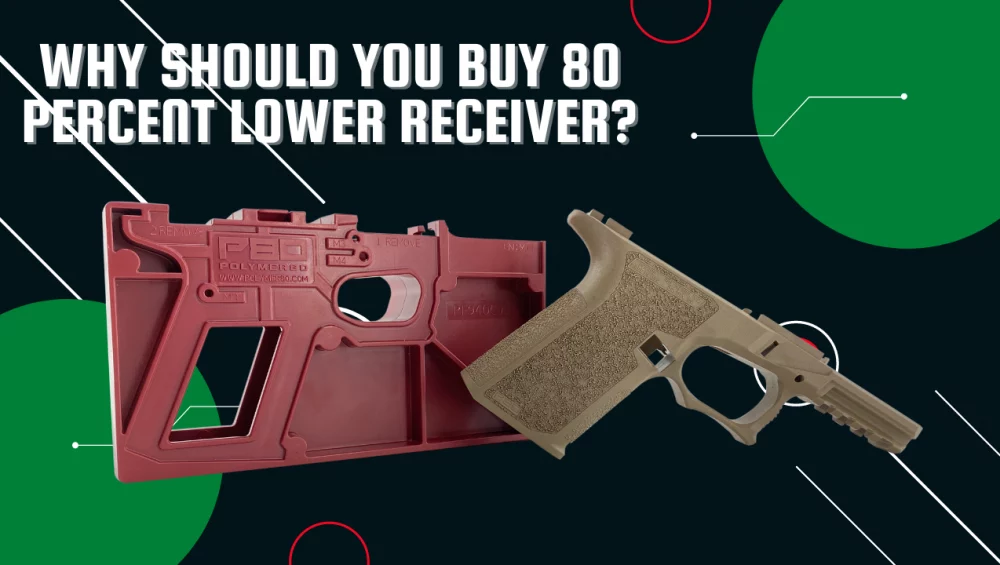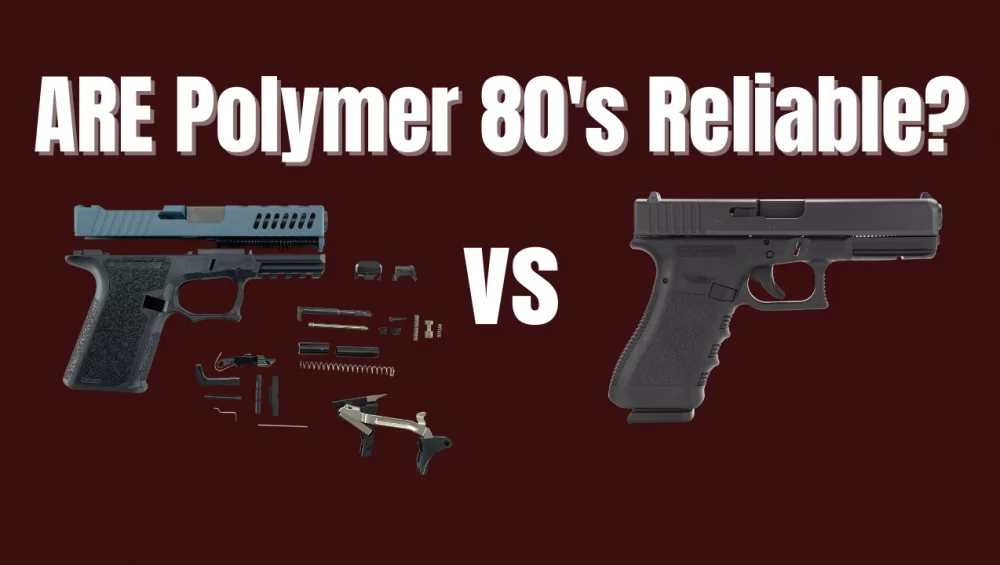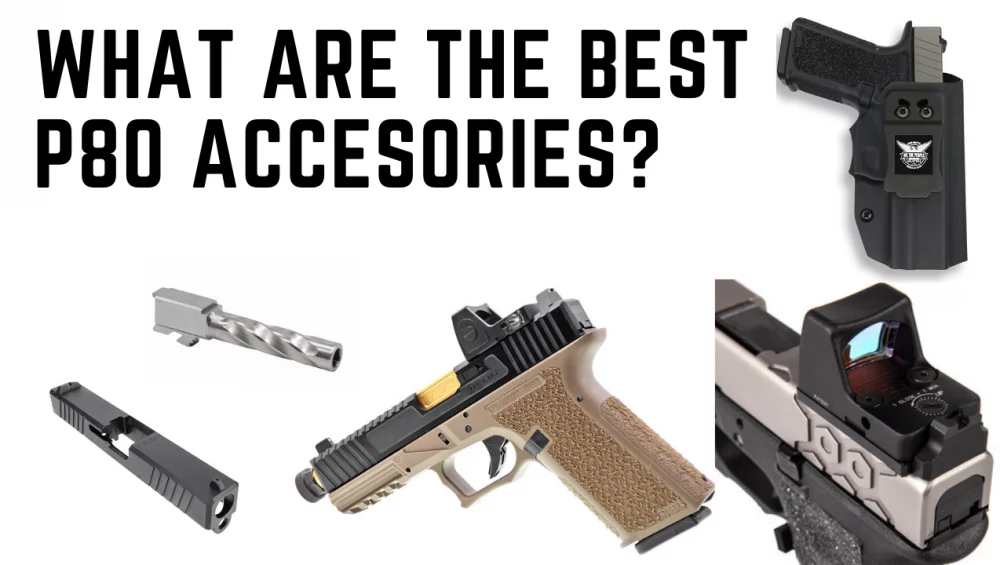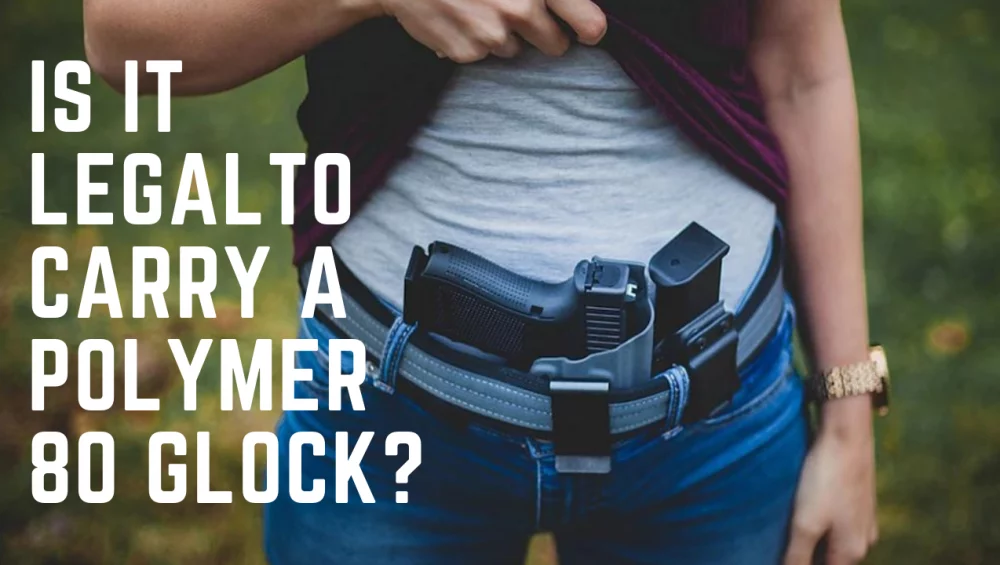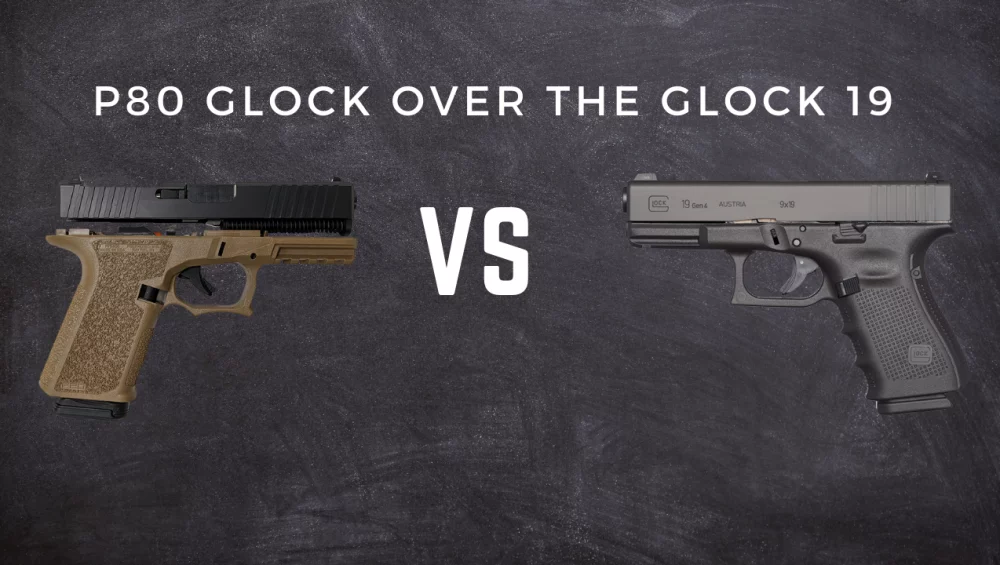Buying a gun is not as cut and dry as some people might think. That is because there are processes like background checks, FFL transfers, tax stamps. All these serve to make the gun buying process just a little more complicated and for the new gun buyer, an experience like that can be uncomfortable. Luckily Owning your own gun does not have to be so difficult because of the 80% Lower.
The 80% Lower is the receiver portion of a firearm which is not completely machined to allow for the assembly of a fire control group. As on an AR-15 80% lower receiver, the trigger cavity is not milled out, essentially being “80%” complete. The 80 lower a topic of controversy as it has been under scrutiny from Anti gun lobbyists and State legislatures across the country. On a federal level, 80% lowers are legal, however some states have restrictions on the sale and transfer of 80% receiver blanks. It is always the responsibility of whoever is buying these to be accustomed to the laws of the state they reside in. While some states require the serialization of 80% lowers, others will not even allow them to purchased at all.
Since 80% lowers are not completely milled out, they essentially bypass whatever Federal laws there are in the sale of firearms, meaning buying an 80% lower is as easy as clicking the check out button. They can be shipped right to the house of the buyer without the need for a 4470 background check or a FFL transfer fee. However, in order to make it a firearm, the trigger pocket is still necessary. There are many methods to completing an 80% lower, most of which involve using some kind of power drill or milling machine, with the aid of either a CAD system or a Jig kit.
Is 80 lower receiver legal?
The answer to this question is multifaceted indeed, as there are now a good many factors that can point in either direction. At this point it is not the most accurate thing to say that 80% lowers are completely legal.
That is because of the legal system in the United States which is separated into Federal and State Governments. What is legal on the Federal level may not be legal on the State level. When it comes to 80% lowers, the ATF regulates the rules on them Federally, but States control the regulations for transfers of ownership of firearms apart from federal requirements. State governments control what must be done in order to make their receiver blanks legal.
Some States like Oregon do not allow even the serialization of 80% lowers, effectively making even the sale of these illegal. However, states like California will allow 80% lowers to be serialized before being made into a fire i.e. milling out the trigger pocket.
On the Federal level, 80% lowers are completely legal, and not by any sort of pushing of the line or “loophole.” In fact, it is actually backed by the ATF that the uncompleted receiver blanks being sold are legal. There are multiple letters issued by the ATF which cover the legalities of these incomplete lowers. This is especially true in the letters that regulate the building and assembly of 80% lowers.
Since they are not 100% complete firearms, they do not legally require a federal background check, however, states that require serialization may require that they be put on the state registry of firearms once serialization is complete.
The best way to be 100% current on the laws regarding 80% lowers cannot be found on the private internet forums or the news media outlets, but in your states Department of Justice, as well as the the ATF website, which contain the actual documents in reference to the laws you are most concerned about. It is safest to approach 80% lowers with the knowledge that you are acting within the parameters set by the federal and state laws that regulate them. Going to the source is how you will remain safe from any hassle from the State or even the ATF itself.
What states forbid the purchase of 80 percent lower?
Here is a list of all of the states that restrict or heavily regulate the sale of 80% lowers for their residents.
New Jersey
80% lowers are illegal in New Jersey. Attorney General Gerbir Grewal in 2018, sent letters to a number of gun parts manufacturers threatening legal action unless they halt future sales in the state. “As the chief law enforcement officer for New Jersey, I demand you stop selling and advertising unregistered and unserialized assault weapons to New Jersey residents,” Grewal says in the letter. “Should you fail to comply with this demand within 15 days, my Office will initiate legal action.” The sale of 80% lowers or “ghost guns” to residents of New Jersey is illegal.
New York
80% Lowers are outlawed in New York as a result of the Attorney General, Leticia James, sending letters of cease and desist to manufacturers in 2019. It is prohibited for residents of the state of New York to purchase 80% lowers. As a consequence, any companies that refuse to abide by the cease and disorder will have to pay a $5000 fine for each violation.
“Your website offers unfinished lower receivers that require simple milling in order to manufacture unregistered and unserialized assault weapons, despite the fact that such manufacture and possession are illegal in New York,” the order reads. “Nor does your website adequately warn New York consumers that using these products in the manner for which they are intended and advertised could result in imprisonment and/or fines.”
Washington State
On April 23rd, 2019 the manufacture and possession of “untraceable”/ “3D printed guns” had become illegal. In HB1379, Washington set the grounds for its laws regarding mainly 3D printed guns. Here is what HB 1379 entails for the state’s residents:
“Except as otherwise provided in this section, it is unlawful for any person to:
– Manufacture, own, buy, sell, loan, furnish, transport, or have in possession or under control, any machine gun, bump-fire stock, undetectable firearm, short-barreled shotgun, or short-barreled rifle;
– Manufacture, own, buy, sell, loan, furnish, transport, or have in possession or under control, any part designed and intended solely and exclusively for use in a machine gun, bump-fire stock, undetectable firearm, short-barreled shotgun, or short-barreled rifle, or in converting a weapon into a machine gun, short-barreled shotgun, or short-barreled rifle;”
– Assemble or repair any machine gun, bump-fire stock, undetectable firearm, short-barreled shotgun, or short-barreled rifle; or
– Manufacture an untraceable firearm with the intent to sell the untraceable firearm.”
“Undetectable firearm: means any firearm that is not as detectable as 3.7 ounces of 17-4 PH stainless steel by walk-through metal detectors or magnetometers commonly used at airports or any firearm where the barrel, the slide or cylinder, or the frame or receiver of the firearm would not generate an image that accurately depicts the shape of the part when examined by the types of X-ray machines commonly used at airports.”
“Untraceable firearm: means any firearm manufactured after July 1, 2019, that is not an antique firearm and that cannot be traced by law enforcement by means of a serial number affixed to the firearm by a federally licensed manufacturer or importer.”
California
California law does not completely outlaw 80% lowers. In fact, as 80% lowers can be bought and sold, but only for builds in rifles. Any 80% frame made for a handgun or a pistol is illegal in California law. Furthermore, any 80% rifle must be California Compliant and must be serialized.
Connecticut
80% lowers are illegal in Connecticut. A law was passed prohibiting the sale and possession of unserialized “receiver blanks” outright. Since the ban is against receiver blanks without serial numbers, and the ATF does not regulate them, and they are not shipped with serial numbers, most 80% lowers on the list are not sent with serial numbers, making it a violation to purchase them from out of state.
Washington D.C.
A letter released in 2020 as a temporary amendment to Official Code 7-2501.01 by the Mayor of Washington D.C. prohibits the sale and ownership of unserialized receiver blanks as part of a list of banned firearms. And in the case of 80% or unfinished pistol or handgun frames, any frame containing less than 3.7 ounces of metal is also strictly prohibited.
An excerpt from the letter:
“The bill prohibits the District from issuing a firearms registration certificate for ghost guns. The bill defines ghost guns as a firearm that, after the removal of all parts except the receiver, cannot be detected by a metal detector that is calibrated and operated to detect the security exemplar? or do not accurately generate an image of the prohibited component in a commonly used detection device at secure federal government buildings and airports. Ghost guns also include an unfinished frame or receivers ‘The bill also prohibits any individual’s possession, sale, transfer, or use of a ghost gun in the District.”
Rhode Island
The Julie Cardinal Act is the document responsible for the prohibition of 80% lowers in the state of Rhode Island. At the time of the passing vote, this was said about the purpose of the act, “Under it, no one can build, own or sell these guns, unless it was made before 1968. Those who legally own ghost guns now have a 30-day grace period to get them serialized.” The ban also prohibits the manufacture of 3D printed frames and receiver blanks as well.
Hawaii
HB 2744 H.D. 1 S.D. 2, “Prohibit[s] the manufacture, purchase, or obtaining of firearm parts for the purpose of assembling a firearm having no serial number.” It is illegal to purchase or own 80% lowers as a result of the aforementioned bill. The bill was passed in 2020 and expresses that no receiver blank can be milled with the intent to make a working firearm.
While it is legal in all other states at the current time, laws are always changing. Therefore it is our responsibility as members of the 80% lower community to be aware of the regulations set forth by the states that make them.
What 80 lower to buy?
Until quite recently, the 80 lower market was quite stagnant. That is to say that the only real 80 lowers out there were made for the AR platform using very cheap composite materials, like those found in 3D printed and polymer lowers.
Now, the market for 80% lowers is much more diverse as advancements in technology have led to increased reliability in composite lowers. 3D printed lowers are becoming more viable, these are lowers that require a 3D printer, and a downloadable file containing the dimensions of the lower. These can then be made into functioning firearms. There is a lot of controversy around a citizen’s ability to make their own gun for personal use at home. That is why a few states have completely outlawed the possession of receiver blanks if they do not contain enough steel in its frame to be considered legal.
Polymer lowers are just like they sound, but they encompass more than just AR platform lowers, but also handguns. That is because there are many polymer framed handguns that can be easily made into 80% lowers using the same principles that the AR receiver blanks are made from. The Polymer 80 company specializes in creating 80% handgun frames from a number of popular models, like the Glock 19 and Glock 43. These can be made for roughly the same price as buying one, but since they are 80% lowers, Federal background checks are not required.
The first attempts to diversify the 80 lower were with the original aluminum AR lowers. In an attempt to make them easier to make, people began to buy raw aluminum to be either billeted or cast, as opposed to the traditional forged lowers circulating the market. Here are the differences between forged, cast and billet lowers.
Forged Lowers- Forged lowers are made from raw aluminum that has gone through proper heat treatment, and hammering to make a strong and durable lower. Forging is the traditional process for which AR lowers are made, and on some level are regarded as the best in the market. Because a hammer is at play, there is not much room for customization on the external parts of the lower.
Billet. Billet lowers are made from raw aluminum blocks and are cut out using a CNC machine with a CAD program. These do not pose any real dangers and are often sought after because they can have unique designs on their exteriors. Durability does not lack, although, earlier versions of these lowers without any heat treatment can have issues near the buffer.
Cast – Cast 80% lowers are easy to make. All it involves is the right raw aluminum or polymer base and a mold. Once the molten aluminum cools, it will harden into a receiver blank which needs extra work to be done in order to be a firearm. However, while they are easy to make, they are also more dangerous to use as opposed to the others. Pressure cracks can easily be exposed after a few rounds of firing, because air pockets may still be present at the time of cooling. While designs can be customized, this can cause even more catastrophic failures: the grain of the aluminum is shifted rather than cut off like in the billet. Cast and billet lowers can both utilize different raw materials when making 80% lowers.
How to serialize an 80% lower?
For whatever reason, you have built your 80% lower AR-15, but you want to get rid of it without selling an unserialized firearm.
How do you go about serializing that so you can dispose of it through an FFL. Unfortunately, there is not a lot of info that is outsourced about getting an unserialized gun serialized unless it is for a state that requires serialization of 80% receiver blanks. That is because most people either do private transfers or keep their unserialized lowers. However, here is a step by step guide on how to get your 80% Lower built Firearm serialized.
Tips:
80% lowers themselves are not legally considered firearms on the federal level. Therefore, it cannot be provided with a serial number since the lower does not classify under what the ATF considers a firearm. This is for 80% lowers that have already been milled out to create a complete firearm. 80% lowers in most states do not require serialization, and because it is not regulated, you can serialize your firearms as you wish for the most part, unless you reside in California and Connecticut.
Here is a list of requirements for 80% serialization. States like California and Connecticut adopted standards set forth by the federal government for serializing a firearm. To comply, your 80% lower, frame, or blank receiver must include:
- Serialization engraved 0.0003″ into the lower receiver.
- A text size no smaller than 1/16″ in height.
Furthermore, the engraved serialization must include:
- ✓ Firearm model
- ✓ City and state of manufacture
- ✓ Firearm caliber
- ✓ Manufacturer’s first and last name
- ✓ For the first and last name segment, you will use your own name, as you’re the manufacturer in the case of an 80% rifle.
Other than what is legally required by states that require serialization, the only guidelines are posted by the ATF. Serial numbers must be done “by engraving, casting, stamping (impressing), or otherwise conspicuously placing or causing to be engraved, cast, stamped (impressed) or placed on the frame or receiver thereof an individual serial number. If you want your serial number to be compliant with ATF standards, here is what you need to do.
City & State of the Importer. Name of Importer, Caliber or Gauge, Model Designation (if assigned), Country of Origin, Name of Manufacturer, Serial Number Must be conspicuously engraved, cast or stamped (impressed) on the firearm frame, receiver, barrel or slide. For firearms imported after January 30, 2002, the engraving, casting or stamping (impressing) of the model designation must be to a minimum depth of .003 inch. And The serial number cannot duplicate the serial number appearing on any other firearm the importer previously imported.
Are 80 Lowers Worth it?
There are a lot of reasons to get an 80 lower. However, there is a negative stigma around them as the media perpetuates false narratives in relentless attempts to catalyze gun control legislation. Thus, there is a toss up that begs the question: Are 80% lowers worth it? Well, here is why you might want to buy an 80% lower.
They are Completely Legal
80% lowers are completely legal to buy in most states. There are only currently 12 states that have any regulations against 80% lowers.
They are cheaper- 80% lowers builds tend to be much cheaper in the long run, especially if you are into customizing builds. While there is a bit of an initial investment to be made in the proper equipment, 80% lowers involve less expenses because there are no transfer fees, background check fees, and the price of the lower will always be cheaper than that of a completed lower.
More customization value
The 80% market is basically a haven for aftermarket products that involve different specs than your standard “mil spec” criteria. With your 80% lower, you control the assembly of the products from beginning to finish. Customizing your 80% lower with different magazines, furniture, and internals is at the heart of what makes an 80% lower build a worthwhile investment.
Buying 80 lowers is as easy as buying anything, and online, there are many websites catering to the overwhelming demands for guns right now. In this way, people can take firearms ownership into their own hands. It takes the government out of our second amendment and places it in your control. As it is right now, there is nothing wrong with making a firearm from a receiver blank for personal use. The end result being of similar quality to name brands for a much cheaper price than name brand price. You don;t have to worry about violating a warranty because the purpose of these 80% lower built firearms is to customize and design them to your needs from the ground up.
What is an 80 lower jig?
If you are new to 80% lowers, you are probably wondering how people go about building their 80% lower firearms. There are a few different ways to finish them, but the most common way to do it is along with a jig kit.
Jig kits are aluminum blocks that assemble around the lower you are preparing to mill. Along with a set of instructions, the jig will guide you along the proper dimensions for whatever spec your lower is. The jig kit is responsible for acting as a safety net between the drill and the lower. It clearly outlines the length and width of the drill measurements, and the depth measurements are clearly outlined in the instructions you are using. Jigs are commonly used with milling machines, and routers, as they are easy to connect to a vise grip. There is no point really in using a jig kit with a CNC machine. There are jig kits for all sorts of 80% lowers out there.
What are jigs made out of?
Jig kits do not only come in one material. There are polymer jigs and even paper jigs which are meant only to outline the dimensions for the trigger port of the receiver. We strictly advise against the use of paper jigs as they often require replacement, whereas stronger materials are able to take much more wear through many more uses. It is a good bang for your buck if you don’t search for the most inexpensive way to mill out your lower. Especially if you intend on making multiple complete lowers, polymer and steel jig kits are optimal.
Where to buy the best Jig Kit?
Each jig kit is good for a certain building method. The best jigs you can buy are the ones that are made for multiple different building methods. Whether using a milling machine, drill press or a hand drill, a jig kit that is sturdy and built to be used well in specific building methods is what you need.
What router to use for 80 lower?
In spite of everything you need to build an 80% lower, a strong, durable, precise router is exactly what you need to ensure the perfect lower every time. Completing lowers takes a good machine that will drill to the correct specifications you need.
the drill itself needs to be able to withstand the materials that most 80% lowers are made out of: Aluminum and polymer. There are stronger materials that 80% lowers can be made out of, like steel, and your router should also be able to withstand that as well. Routers are generally much quicker than drill presses, and only require a precise hand, and quality parts to work with. In execution, routers function much like drill presses, however are capable of finishing lowers much quicker. Although you are sacrificing some security during the building process, finishing 80% lowers takes a steady hand and patience. There are jigs that are specially made for routers which can
Here is a list of viable Routers for you, should you choose to use a router:
Makita RT0701C 1-1/4 HP Compact Router for 80 Lower
If you are looking to mill an aluminum 80% lower than the Makita RT0701C 1-1/4 HP is the best one on the market. These are especially made for 80% lowers.
Specs:
- ✓ 10k-30 RPM Control Dial. The speed is easy to adjust.
- ✓ Cam lock quick release system makes changing the depth or bits easy and quick.
- ✓ Slim, ergonomic. Comfortable and easy to control.
- ✓ Electronic control of speed maintains it while under load.
- ✓ Starts up smoothly with the smooth start feature.
- ✓ The base design allows for high visibility.
- ✓ Durable, the motor is made of heavy-duty aluminum.
DEWALT DWP611 Router, Fixed Base, Variable Speed
This option is cheap and reliable, and has great durability. It will do its job for a while before it actually needs to be replaced.
Specs:
- ✓ 16k-27k RPM adjustable speed 7A motor
- ✓ Soft starting allows for smoother milling in the beginning
- ✓ Spindle lock button gives a quick single wrench change of bits
- ✓ Motor quickly transitions between plunged and fixed bases
- ✓ 8 slot ¼ in collet enables tighter grip
- ✓ Dual LED work lights
- ✓ Over molded handles for a firm and comfortable grip
Bosch 1617EVSPK Wood Router Tool Combo Kit
This is the most versatile of the bunch as it is able to do many things with its combo kit. It has a powerful 12 amp motor which makes milling lowers out very efficiently..
Specs:
- ✓ 12 Amp motor with precise speed adjustments and speed maintenance (8k-25k RPM)
- ✓ Versatile router that can be used for woodcarving
- ✓ Very comfortable grip, easy navigation
- ✓ One of the most accurate plunge bases
- ✓ Aluminum casing and motor make it extremely durable
Makita XTR01Z 18V LXT Cordless Compact Router
This a cordless router practically made for finishing 80% lowers. It is compact, but powerful, producing around 30k rotations per minute.
Specs:
- ✓ 10k-30k RPM with fine-tuned electronic speed adjustments
- ✓ Slim and ergonomic design gives comfort and ease when handling
- ✓ Start-lock prevents unintentional engagement of the router
- ✓ Durable aluminum housing
- ✓ 5Ah battery
- ✓ Brushless motor that maintains speed under friction and resistance
Milwaukie 55MN0718V Compact Cordless Router
An ergonomic and safe router that is compact and powerful enough to do everything you needit to do.
Specs:
- ✓ 5Ah rechargeable Li-Ion battery with long work time
- ✓ Switch push button
- ✓ 0-31k Max RPM and adjustable speed control
- ✓ 900W brushless motor
- ✓ Comfortable and easy-to-control housing
Why buy an 80 lower?
There are many reasons to buy an 80% lower. First of all, they are cheaper than completed firearms. Whether in an online sale with a transfer fee, or at a storefront, you should never check out with an 80% lower that cost more than a complete lower.
80% lowers are cheaper because they involve the same material, but less work is done in the machining, therefore driving the cost down. 80% lowers are not legally considered firearms, and therefore do not require a federal background check, so naturally that means no federal background check fee. That also means no FFL Transfer fee, so there is easily $20-$50 off on what you would have to pay in an online transaction with a firearm.
80% lowers are often unbranded. Because of this, you are not paring the price of the name brand like you might be on a completed lower. This reduces the price on not only the lowers you are purchasing, but their parts as well. Purchasing a whole 80% lower can be as cheap as $300 because of the name you no longer have to pay for. Getting the necessary tools to build 80 lower firearms is the only investment you will have to make in order to get essentially discounted firearms.
Customization is one of the key aspects of 80% lowers. They are essentially aftermarket by nature, as AR-15 80% lowers are not built from the actual AR lower. They are more commonly derivatives of the DPMS AR lowers. The aftermarket around the AR-15 is very vast, and yet, you will come out paying usually a much cheaper price depending on the parts you use. But that is just what is at the heart of the 80% lower. You get to choose what to put onto your gun, for a much cheaper price, and without the government asking for more money.
Machining a lower without a jig. Can it be done?
Luckily, an 80% lower does not require a jig in order to be milled out properly. In fact, you can do it with paper outlines that, when fastened to the lower in the proper way, will give you the correct dimensions to mill.
However, you can also make use of other methods as well, namely those involving CNC machines and cad programs. With these, it is possible to plug in the lengths width and depth measurements for all dimensions of the lower, and the machine will respond with an expertly milled, completed receiver. There are plenty of ways to do it, the CNC machine being the safest method out of any of them to complete 80 lowers.
Milling an 80 lower without a drill press, can it be done?
Many people use a drill press to complete their unfinished lowers. However, that is not required to complete one.
Especially if the lowers are not made of harder materials, sometimes all you need is a dremel tool. But let’s say it is a harder material, a drill press is still not ultimately necessary to complete the build, You can use a milling machine, a router, or a CNC machine in order to complete your 80% lower. You need to have a plan on how you build. Different tools have different advantages and disadvantages that can cause things to go differently if the proper care is not taken. It is not recommended at all to mill a lower with only a drill press.
80 percent lower without a router. Can it be done?
One of the reasons people love 80% lowers is for their accessibility and ease of build. That is because you can use many power tools to get the same effect.
Routers are another commonly used tool for milling out 80% lowers. However, routers can often be dangerous if used by someone not familiar with them. It takes knowing your router well enough to be able to efficiently use it to complete a receiver blank. There are alternative methods with the use of a milling machine or a CNC machine. It is important to remain as safe as possible to produce the perfect 80% lower for your build.
80% Lower Vs Complete Lower
80% lowers become complete lowers when a builder mills out the trigger pocket and installs all of the necessary components to make the lower ready to be assembled with an upper.
Buying a complete upper is the same as buying a firearm because the ATF regards only the lower on the gun to be a firearm. All other components are not considered firearms, which is why anyone can buy a complete upper, but not a complete lower without a background check. 80% lowers can be bought just like the other components, so you can essentially get a whole AR-15 kit shipped to your house, with the only requirement being that you have to mill out the trigger pocket and install everything yourself.
Complete lowers will come with the trigger assembly, the stock assembly an the grip all together to form what would essentially be half of a whole gun kit while 80% lowers don’t come with anything installed in them. They can be sold separately or with the necessary components in the same packaging. Installation is usually done by the builder when it comes to 80% lowers because it is not ideal to mill the lower with a full stock assembly on the lower.
80 Lower Polymer vs Aluminum
There is a disconnect in the community with those who prefer the quicker method as opposed to what would be considered a safer, more reliable method.
Composite material lowers are some of the most popular among budget builder, and luckily with the advancements in polymer technology, newer polymers are becoming stronger and astronomically more resilient. However, is it enough to go through the beatdown that a s forged T6-7075 block of aluminum can? That is still debatable as there is a good portion of the community that stands by the use of their polymer 80% lowers. Especially since even Aluminum 80% lowers saw an increase. in price due to the overwhelming demand that came in the gun industry in 2020. Polymer is becoming a more viable option for the 80% lower AR-15 platform. However, Polymer dominates the 80% handgun market as sales for p80s rival that of Glocks complete sales.
80% Lower Raw vs Anodized
Most of the lowers you see for sale are anodized lowers. This is a electro-chemical process conducted on metals, especially aluminum, which hardens the outside layer, making it resistant to rust and corrosion.
Aluminum is a metal that requires a lot of maintenance if not finished, so anodization prevents having to maintain the lower from rust from water or corrosion from the oils on our fingers. Raw 80% lowers can be useful, as most other finishes require the lower to be raw before the process can begin.
Especially if you plan to make your 80% lower build a different color other than black, options like Cerakote and powder coat require the lower to be raw.
When buying a raw lower over an anodized one, the price will be somewhat cheaper because the cost of the anodization is not included in the price. However, in order to get it finished, you will either have to use your own resources or seek the help of a metal fabrication company that specializes in coatings made for guns.
Anodization is a cheap finish for any lower. It doesn’t use a lot of resources and doesn’t take a lot of energy to complete. Anodized lowers turn out much cheaper than those done in powder coat, cerakote, or hydro dip. Anodization is not a process that involves adding material onto the external of the frame like other paints. Its process alters the exterior layer of the metal to create a dense shell. This technique hardens the outer layer, but keeps the inner material soft and able to take more pressure without deforming. It is a versatile finish that exemplifies modern techniques in finishing metals for firearms.
80% Lower Forged Vs Billet
AR 80% lowers are traditionally forged into form with the use of hammers and heat treatment. However, over the years, newer methods of manufacturing 80% lowers came out; the most popular being the billet lower.
Billet lowers are characterized by the process from which they are made, which is from a block of aluminum. These lowers are cut out to shape usually with T7 6061 aluminum. The lower is drilled and tapped for the buffer tube, but is left relatively untouched as it is an 80% lower. The benefit of billet lowers is diversity in design. Because a machine is responsible for cutting excess metal off of the lower instead of pounding it like in forged lowers, it is much easier to cut out a specific design. Companies make use of this by selling lowers with unique designs on them.
80% lower Receiver vs Stripped
What is a stripped lower in comparison to an 80% lower? A stripped lower is a lower that is completed, but does not have any of its components installed.
While the trigger is not actually installed on a stripped lower, it is still legally considered a firearm as the milled out receiver is what is considered a firearm. A stripped lower is much like an 80% lower in that it still needs the parts installed. An 80% lower is not considered a firearm until it milled out, in which case it would become a stripped lower until the parts are actually installed in it. Stripped lowers serve the purpose that 80% lowers do to a certain degree. They involve less work than 80% lowers, but will involve you paying more for essentially the same item that you could have bought for much cheaper as an 80% lower.
80 Lower Vs Drill Press
The Drill press is one power tool people use to finish their 80% lower receivers. They are usually easy to use and much safer than routers. They are not too different from milling machines as milling machines can typically be used for drilling.
However, Drilling presses are meant first to drill holes into metal, which is most of what you need to do in order to finish an 80% lower. Drill presses do not offer as much capability as the milling machine, because the milling machine is capable of creating horizontal cuts, whereas the drill press is primarily made for cutting round holes into hard materials. It may take longer to get the desired effect, however, the drill press is still a viable tool for machining 80% lowers, especially with the help of a jig kit.
80 lower ATF Ruling
Currently 80% lowers are legal on the federal level, and not due to any level of “loopholes” the media might tell you about. In fact they are legal because of the regulations on them that confirm them.
The ATF is the ruling authority on Alcohol, Tobacco, Firearms, and Explosives. The ATF typically comes out with letters in which it outlines the “rules” for how people can own and prepare “receiver blanks” or 80% lowers. There is currently no law against the sale, possession or production of 80% lowers. Because the ATF does not regulate items that are not firearms, they cannot regulate them as firearms unless legislation passes that requires them to.
80% Lower Background Check Necessary?
For new gun owners, or people new to 80% lowers in general, it might be unclear how to go about purchasing them.
80% lowers are not considered firearms by the ATF, and therefore do not require the Federal background checks as a prerequisite to purchasing an 80 lower. On a state level, things get a little more complicated as States are able to regulate the transfer of 80% lowers, require background checks, and enlist registries in order to track and record transfers. It behooves anyone looking to purchase an 80 lower receiver to be aware of the laws of their state in order to make sure that no laws are being broken. Especially in the states in our previous topic, 80% lowers are heavily regulated and some states require serialization before they can enter the state.
80 Lower Dimensions
The Dimensions of the AR-15 are manufactured to a certain specification. The industry standard, although taken loosely, is “Mil Spec.” This simply means that the dimensions and finish are to the specification that the military requires. There are some companies which deviate from this standard, however, since most of the products cater to this specification, it is more limiting to choose something that isn’t.

